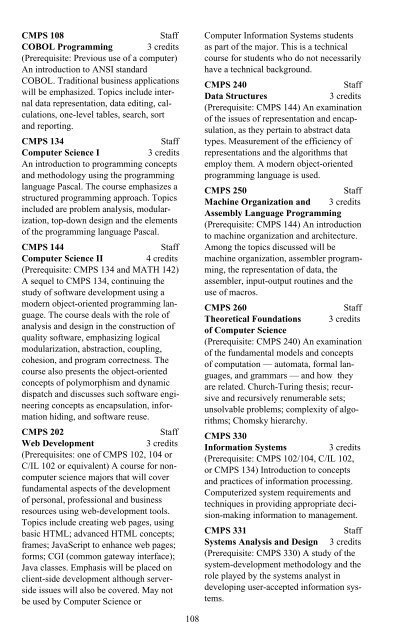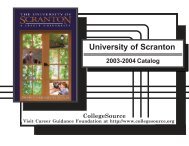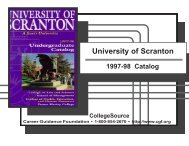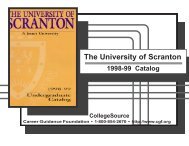1999-2000 - The University of Scranton
1999-2000 - The University of Scranton
1999-2000 - The University of Scranton
Create successful ePaper yourself
Turn your PDF publications into a flip-book with our unique Google optimized e-Paper software.
CMPS 108 Staff<br />
COBOL Programming 3 credits<br />
(Prerequisite: Previous use <strong>of</strong> a computer)<br />
An introduction to ANSI standard<br />
COBOL. Traditional business applications<br />
will be emphasized. Topics include internal<br />
data representation, data editing, calculations,<br />
one-level tables, search, sort<br />
and reporting.<br />
CMPS 134 Staff<br />
Computer Science I 3 credits<br />
An introduction to programming concepts<br />
and methodology using the programming<br />
language Pascal. <strong>The</strong> course emphasizes a<br />
structured programming approach. Topics<br />
included are problem analysis, modularization,<br />
top-down design and the elements<br />
<strong>of</strong> the programming language Pascal.<br />
CMPS 144 Staff<br />
Computer Science II 4 credits<br />
(Prerequisite: CMPS 134 and MATH 142)<br />
A sequel to CMPS 134, continuing the<br />
study <strong>of</strong> s<strong>of</strong>tware development using a<br />
modern object-oriented programming language.<br />
<strong>The</strong> course deals with the role <strong>of</strong><br />
analysis and design in the construction <strong>of</strong><br />
quality s<strong>of</strong>tware, emphasizing logical<br />
modularization, abstraction, coupling,<br />
cohesion, and program correctness. <strong>The</strong><br />
course also presents the object-oriented<br />
concepts <strong>of</strong> polymorphism and dynamic<br />
dispatch and discusses such s<strong>of</strong>tware engineering<br />
concepts as encapsulation, information<br />
hiding, and s<strong>of</strong>tware reuse.<br />
CMPS 202 Staff<br />
Web Development 3 credits<br />
(Prerequisites: one <strong>of</strong> CMPS 102, 104 or<br />
C/IL 102 or equivalent) A course for noncomputer<br />
science majors that will cover<br />
fundamental aspects <strong>of</strong> the development<br />
<strong>of</strong> personal, pr<strong>of</strong>essional and business<br />
resources using web-development tools.<br />
Topics include creating web pages, using<br />
basic HTML; advanced HTML concepts;<br />
frames; JavaScript to enhance web pages;<br />
forms; CGI (common gateway interface);<br />
Java classes. Emphasis will be placed on<br />
client-side development although serverside<br />
issues will also be covered. May not<br />
be used by Computer Science or<br />
108<br />
Computer Information Systems students<br />
as part <strong>of</strong> the major. This is a technical<br />
course for students who do not necessarily<br />
have a technical background.<br />
CMPS 240 Staff<br />
Data Structures 3 credits<br />
(Prerequisite: CMPS 144) An examination<br />
<strong>of</strong> the issues <strong>of</strong> representation and encapsulation,<br />
as they pertain to abstract data<br />
types. Measurement <strong>of</strong> the efficiency <strong>of</strong><br />
representations and the algorithms that<br />
employ them. A modern object-oriented<br />
programming language is used.<br />
CMPS 250 Staff<br />
Machine Organization and 3 credits<br />
Assembly Language Programming<br />
(Prerequisite: CMPS 144) An introduction<br />
to machine organization and architecture.<br />
Among the topics discussed will be<br />
machine organization, assembler programming,<br />
the representation <strong>of</strong> data, the<br />
assembler, input-output routines and the<br />
use <strong>of</strong> macros.<br />
CMPS 260 Staff<br />
<strong>The</strong>oretical Foundations 3 credits<br />
<strong>of</strong> Computer Science<br />
(Prerequisite: CMPS 240) An examination<br />
<strong>of</strong> the fundamental models and concepts<br />
<strong>of</strong> computation — automata, formal languages,<br />
and grammars — and how they<br />
are related. Church-Turing thesis; recursive<br />
and recursively renumerable sets;<br />
unsolvable problems; complexity <strong>of</strong> algorithms;<br />
Chomsky hierarchy.<br />
CMPS 330<br />
Information Systems 3 credits<br />
(Prerequisite: CMPS 102/104, C/IL 102,<br />
or CMPS 134) Introduction to concepts<br />
and practices <strong>of</strong> information processing.<br />
Computerized system requirements and<br />
techniques in providing appropriate decision-making<br />
information to management.<br />
CMPS 331 Staff<br />
Systems Analysis and Design 3 credits<br />
(Prerequisite: CMPS 330) A study <strong>of</strong> the<br />
system-development methodology and the<br />
role played by the systems analyst in<br />
developing user-accepted information systems.
















